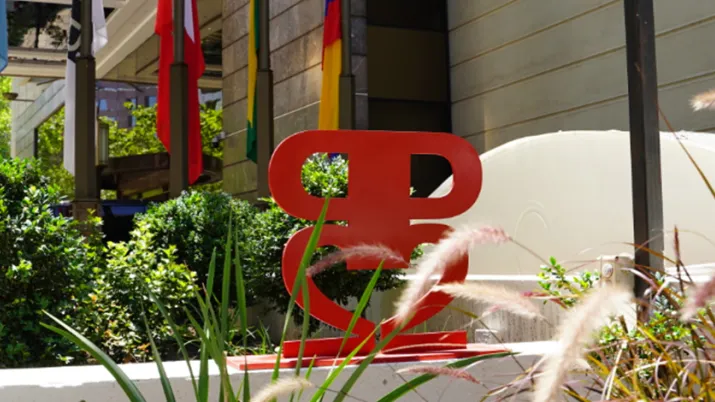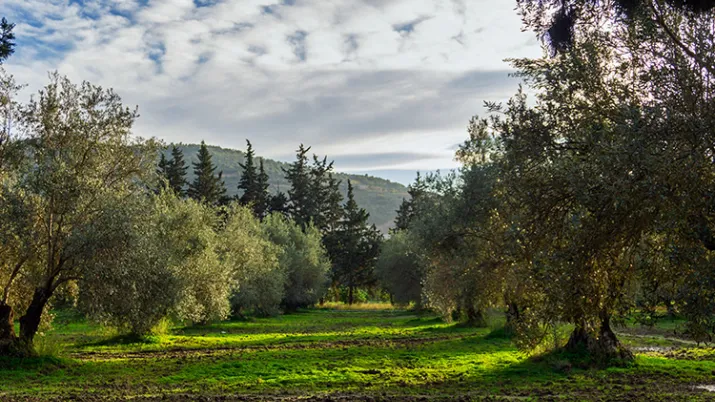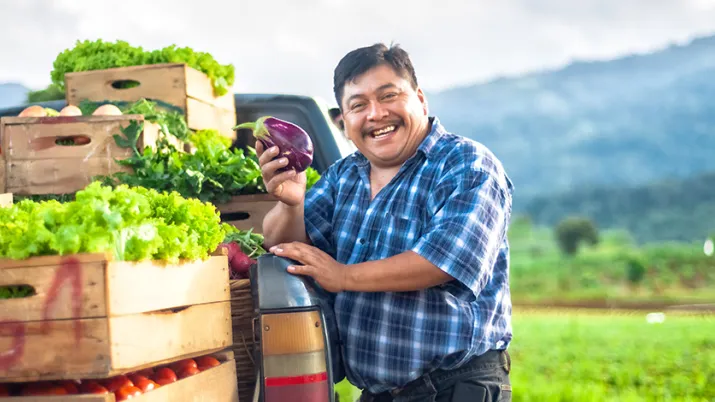Share the page
Protecting food security and agriculture - Our work and impact
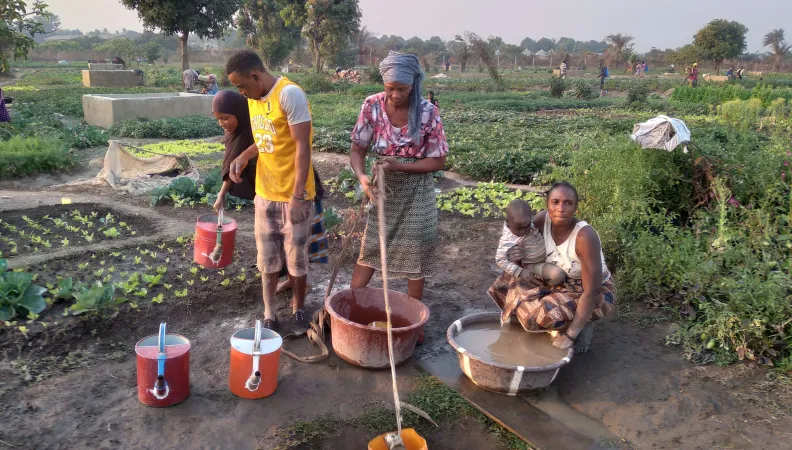
The figures speak for themselves: according to a United Nations (UN) report entitled “The State of Food Security and Nutrition in the World 2023”, between 713 and 757 million people suffered from hunger in 2023. This equates to one in eleven people worldwide and one in five people in Africa. We also know that land degradation has reduced the productivity of the global land area by 23%. Furthermore, part of the world’s annual agricultural production, with an estimated market value of $577 billion, is at risk of disappearing due to the loss of pollinators.
These findings show just how vital it is to define and implement strategies for agricultural development and sustainable natural resource management, and why these are major challenges for the 21st century.
As the French international development cooperation agency, we help stakeholders in the agricultural and rural sectors across the world, including farmers, fishers, family farms, professional organisations, micro-businesses, SMEs, public institutions, and related government departments and ministries. We assist them in their transition to sustainable agricultural and food systems that take account of climate change, resource conservation, and food security challenges.
In line with its activities to strengthen relevant sectors, Expertise France is implementing several projects to develop the fishing and aquaculture industries. These contribute significantly to the economic development of the regions in which we operate and to the food security of many households.
8 % of current agricultural land will become climatically unsuitable by 2100
According to the Intergovernmental Panel on Climate Change (IPCC), 8% of current agricultural land will become climatically unsuitable by 2100, with this figure rising to 30% in worst-case-scenario predictions. The yields of major crops such as corn, soybeans, rice, and wheat are already being affected, with estimates suggesting total cereal production decreased by 9–10% between 1981 and 2010.
Our strategic priorities
Our work to support the development of sustainable and resilient agriculture, particularly in relation to climate change, has several objectives:
- Ensure a transition to sustainable agricultural and food systems that take account of climate, biodiversity and food issues
- Promote food and nutritional security, poverty reduction, and food sovereignty
- Strengthen institutions and local governance in rural, marine, and coastal areas
Our work is divided into five strategic areas:
- Support institutions to develop and implement public policies for agriculture and rural areas as well as the blue economy
- Support producer organisations, family farms, micro-businesses and SMEs with their transition to agricultural and fishing practices that ensure their economic, social, and environmental sustainability
- Strengthen competitiveness, value creation, and job creation in agricultural sectors
- Strengthen the role of local and national institutions in the governance of the agricultural sector
- Contribute to sustainable land use planning and promote the local governance of rural, marine, and coastal areas
“Agriculture is diverse and multifaceted: it is faced with multiple challenges, and to support the desired food system transformations towards more sustainability and resilience, farming policies must be adapted by considering farm diversity.”
- Coordinator with World Agriculture Watch

Our framework for action
At the international level, food and nutritional security has once again become a priority for development. Our agency’s work is therefore in line with the United Nations Sustainable Development Goals (SDGs) – in particular SDG 2 on “zero hunger” and SDG 12 on “responsible consumption and production”. It also aligns with the objectives set by the Paris Agreement and the Kunming Global Biodiversity Framework adopted in December 2022 in Montreal.
Through our work, we contribute to:
- The French international strategy for food security, nutrition and sustainable agriculture (2019–2024)
- The Food and Agriculture Resilience Mission (FARM) initiative launched under the French Presidency of the Council of the European Union, which aims to provide a comprehensive response to food security challenges in the context of the war in Ukraine
- France’s international cooperation goals as set by the Presidential Council for Development and the Interministerial Committee for International Cooperation and Development. These include “protecting the most vital carbon and biodiversity reserves in forests and the ocean to preserve the planet” (goal 2) and “strengthening food sovereignty, particularly in Africa" (goal 7)
- The organisation of several major events such as the One Water Summit, which France and Kazakhstan jointly organised in Riyadh in December 2024; the Nutrition for Growth Summit organised in Paris in March 2025; and the United Nations Ocean Conference (UNOC) organised by France and Costa Rica in Nice in June 2025.
- The Agence Française de Développement (AFD) framework paper for agriculture, rural development and biodiversity, which focuses the Group’s activities around three priorities: contribute to production and green transitions; support cohesive, inclusive, resilient rural areas; and promote institutions and policies that support ecological, productive and regional and local transitions.
For further reading
Our services in this area
Our agency offers a comprehensive range of services that address a variety of issues, including rural energy, agricultural entrepreneurship, water resources, forest and ocean biodiversity, the blue economy, nutrition, food stability and security in crisis areas. We work at different levels with our international partners, offering them comprehensive, tailor-made solutions:
- Develop and implement public policies for agriculture and rural areas as well as the blue economy: We do this by establishing multi-stakeholder consultation frameworks; capacity building for relevant partners; support for the implementation of information systems; targeted studies; development of pilot projects; and monitoring and evaluation of public policies
- Support producer organisations, fishers, family farms, micro-businesses and SMEs: We facilitate the launch of agricultural consulting services; the revision and development of courses in vocational training in agriculture; training for local stakeholders; support for professional organisations; and support for access to finance.
- Strengthen competitiveness, value creation and job creation: We conduct market and consumer studies; rehabilitate and construct infrastructure for processing and bringing produce to market; train private and public organisations in improved product traceability; support laboratories with accreditation and certification; carry out marketing studies; implement pilot projects in production lines and packaging; develop market information systems; facilitate stakeholder networking; and foster participation in international events.
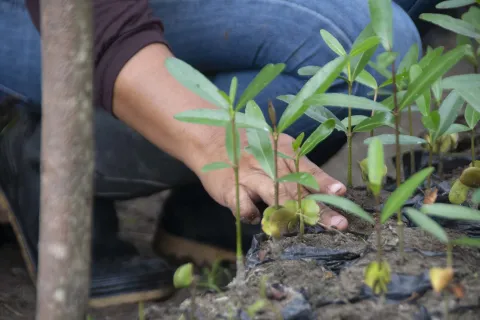 © MarioRubioPhoto.com
© MarioRubioPhoto.com
- Strengthen the role of local and national institutions in governance: We facilitate stakeholder networking and capacity building for producer organisations & farmers’ unions; develop information systems for stakeholders in the sector; facilitate the organisation of events to promote the sector; provide legal advice, for example on changing business structure or business models; and establish collaborative forums.
- Contribute to sustainable land use planning and support local governance: We help establish resource monitoring mechanisms (fisheries information systems); develop land use planning tools; build and rehabilitate infrastructure such as rural roads and port infrastructure; fund local civil society organisations; and create stakeholder maps.
Our support therefore comes in a variety of services tailored to our partners’ needs. Our work can lead us to deploy French and European experts in agricultural development; collaborate with experts from our partner countries, both in the public and private sector; or cooperate with French and international partners, including CIRAD, the French agricultural research and cooperation organisation, AFNOR, the French standards authority, or Groupe Initiatives, the national representative body of French non-profits operating in international cooperation.
Ressource à télécharger
FAQs
For more about food security and agriculture
Adapting agriculture to climate change involves transforming production systems to make them more resilient, sustainable, and low-emission. Agroecology is the preferred approach. It is based on crop diversification, sustainable water use on farms, tree maintenance, and better risk distribution between crops.
For Expertise France and the Agence Française de Développement (AFD) Group, it is a key tool for adaptation, both to maintain secure food production in the face of climate hazards and to limit the environmental impact of the agricultural sector, which is a particularly high emitter of greenhouse gases.
Agriculture is a key driver of economic and social development. It accounts for a significant share of employment, particularly in rural areas, and plays an essential role in food security, natural resource management and the reduction of inequalities.
According to the Agence Française de Développement (AFD) Group’s framework paper for agriculture, rural development and biodiversity, investments in agriculture are two to three times more effective at reducing poverty than in any other sector. Sustainable agricultural development helps support the green transition and create economic and social opportunities.
Poverty in rural areas is characterised by limited access to income, economic opportunities and essential services like education, health and infrastructure. This issue primarily affects family farms, small-scale fishers and aquaculturists, women, and marginalised populations living in isolated rural areas. It also leads to increased vulnerability to unforeseen events as well as climate, economic and security risks.
To combat rural poverty, we must adopt a comprehensive approach focused on:
- Strengthening family farms to enable them to produce sustainably, boost their competitiveness in relevant sectors, and ensure their economic viability in the face of increased pressure on natural resources
- Increasing collaboration at local and regional level
- Supporting rural employment, particularly for young people and women
- Improving local governance, democracy, and institutions in rural areas
A sustainable food system guarantees long-term access to sufficient and adequate nutrition for all populations, while preserving natural resources and biodiversity.
The transition to sustainability must include all stakeholders in the food chain, from producers to consumers. This requires a balanced approach that takes account of environmental, economic, and social dimensions, without which the transition cannot be fair or effective.
According to the Food and Agriculture Organization (FAO), food security is achieved when all individuals have access to sufficient food (both in terms of quality and quantity) at all times, enabling them to meet their dietary needs and lead a healthy life. It is based on four pillars: availability, access, utilisation (nutritional and health), and stability over time.
For more information, a replay of our Rendez-vous de l’Expertise is available. This live panel discussion, which was organised by Expertise France, brought together experts from various fields to discuss food security.
The concept of nutritional security is based on three key elements: food security, health, and healthcare. A population may have access to food and still suffer from malnutrition. Nutritional insecurity has harmful long-term consequences on the health and physical and intellectual abilities of individuals.
Food security focuses on a population’s access to sufficient and nutritious food, while food sovereignty is a political concept that affirms the right of populations to define their own food and agricultural systems. According to the Food and Agriculture Organization (FAO), food sovereignty implies that seeds, water, and land are a common good – they must therefore be protected rather than exploited for private interests. Food sovereignty is also a fundamental pillar for ensuring national resilience against food insecurity and geopolitical instability.
Developing sustainable agriculture requires:
- The adoption of agroecology methods through crop diversification, soil and water management, and limited the use of chemicals
- The strengthening of family farms
- The introduction of climate issues into agricultural policies, including adaptation and mitigation strategies
- Support for local industries and promotion of environmentally friendly production (labels, certifications)
Inclusive local and regional governance that promotes dialogue and consultation at the local level between different users of natural resources
Our projects
